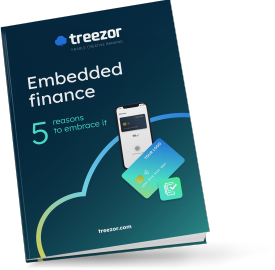#3: Allowing a more efficient and productive organization
Investments dedicated to digital transformation are estimated at $3.4 trillion in 2026 globally, compared to $1.8 trillion in 2022. In this context, the integration of financial services allows companies to be more efficient, for example, through ERP automation and management system integration. All businesses are affected, and companies are therefore moving towards more flexible and real-time management systems. This ease of management is largely supported by embedded finance modules that are seamlessly integrated into applications. This is how the “neo-banks” have emerged, thanks in particular to the development of BaaS platforms.
“Shine is a fintech that has developed thanks to the deployment of Open Banking, in line with the two directives on payment services, DSP1 and DSP2,” attests Raphaël Simon, Managing Director of Shine.
#4: Generating new sources of revenue
One of the great strengths of embedded finance is the interoperability of solutions, allowing it to expand its service offering. Aware of this strong potential, Treezor has thus integrated Franfinance’s API into its One-stop-shop offer, allowing it to provide its customers with a consumer credit offer.
“We are targeting fintechs and corporates that want to offer their own customers a turnkey credit offering, but have not yet reached the critical size needed to develop this activity,” explains André Gardella, CEO of Treezor.
#5: Using a technology of the future
Far from being a static technology, BaaS platforms are constantly innovating and providing new solutions. The payments industry is evolving rapidly, and all players must be capable of responding to important challenges. One of these challenges is technology. For strategic reasons, some companies or fintechs choose to operate under their own license (obtained from the ACPR, an administrative authority in charge of the supervision of banking and insurance undertakings in France) but continue to use the core banking of a BaaS solution.
“As of April 2021, we are an Electronic Money Institution (EMI) and, as of December 2021, a Mastercard Prime Member. We use a BaaS solution for services that we do not want to insource. It acts as the link between issuers and banks for the payment part. This is a major challenge,” says Quentin Vigneau, Head of Product Payment at Swile.
About Treezor: www.treezor.com
Founded in 2016 by two French entrepreneurs, Treezor is a fintech regulated in 25 countries as a Payment and E-Money Institution and also a key member of international card networks.
Acquired in 2019 by the Societe Generale group, Treezor is the European Banking-as-a-Service (BaaS) leader with a presence in France, Germany, Benelux, Italy, and the Iberian Peninsula. Treezor’s embedded finance solution enables companies to integrate white-label payments into their offer, without any constraints, by outsourcing all the technical aspects via API (from acquiring to issuing), regulatory aspects (KYC, AML-CFT, etc.) and security aspects to an international team of experts.
Treezor is a “Unicorn farmer” that has supported the emergence of many European payment unicorns.
Follow us on Twitter @TreezorBanking and our LinkedIn page.
Press contacts:
Omnicom Public Relations Group – france.treezor@omnicomprgroup.com
Laure Boutron – laure.boutron@treezor.com
